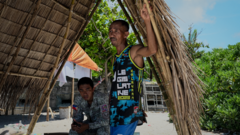Pagasa Island, known as “Hope,” is emerging as a symbol of resistance against China's assertive maritime presence in the South China Sea, where geopolitical tensions run high. The island, measuring just 37 hectares, is home to approximately 300 residents who rely on fishing and limited agriculture to sustain their community.
Despite its small size, Pagasa plays a critical role in the Philippines' territorial claims due to its solid land status, unlike other disputed reefs. Assistant Director-General of the Philippines National Security Council, Jonathan Malaya, highlighted its significance by stating, "Pagasa is very important to us... It can support life and has a resident Filipino community."
Just offshore lies a considerable fleet of Chinese vessels from the navy and coastguard, a constant source of intimidation for the island's inhabitants. Over the last decade, China has significantly increased its dominance in the region through aggressive construction and deployment of ships. Few Southeast Asian nations have openly challenged China's maritime claims, making the Philippines' efforts particularly noteworthy.
Reaching Pagasa Island is not easy; it requires a two-to-three-day boat ride or a one-hour flight, both highly dependent on weather conditions. Recent upgrades, including a longer runway for larger aircraft, have improved access. The Philippine government has invested in facilities like a hangar, utilitarian buildings, and plans for a control tower, all aimed at bolstering the island's defense and community resilience.
Residents live a simple life supported by monthly government provisions. However, fishing has become increasingly challenging due to aggressive tactics employed by Chinese vessels, as demonstrated by fisherman Larry Hugo, who now fishes closer to shore due to safety concerns.
Education and healthcare remain pressing issues for Pagasa's residents, as access can be severely limited during bad weather. Local teacher Realyn Limbo remarked, "To me this island is like paradise," yet acknowledged the difficulties they face, particularly concerning health emergencies.
The Philippines' diplomatic stance has shifted compared to the previous administration, with Malaya confirming the government submits weekly protests to the Chinese embassy regarding its ships' presence. This firm approach undoubtedly aims to reinforce Filipino sovereignty in the highly contested waters.
Pagasa Island exemplifies the delicate balance between its peaceful, resilient community and external pressures, standing as a frontline in the broader South China Sea dispute, where China's growing dominance continues to threaten regional stability.

















